Hypoglycemia Education Project: Signs, Symptoms & Management Guide
VerifiedAdded on 2023/06/03
|7
|1640
|459
Project
AI Summary
This project aims to develop an educational package, specifically a pamphlet, for newly diagnosed diabetes patients to reduce the incidence of hypoglycemia by educating them about its signs, symptoms, and management. The significance of addressing hypoglycemia lies in its detrimental effects on the physiological state and overall quality of life. Unlike factsheets, pamphlets offer a comprehensive range of information to enhance understanding. The project involves distributing these pamphlets in medical institutions and educating participants during clinic visits, followed by a survey to evaluate the pamphlet's effectiveness in controlling hypoglycemia, while prioritizing veracity and clear information.
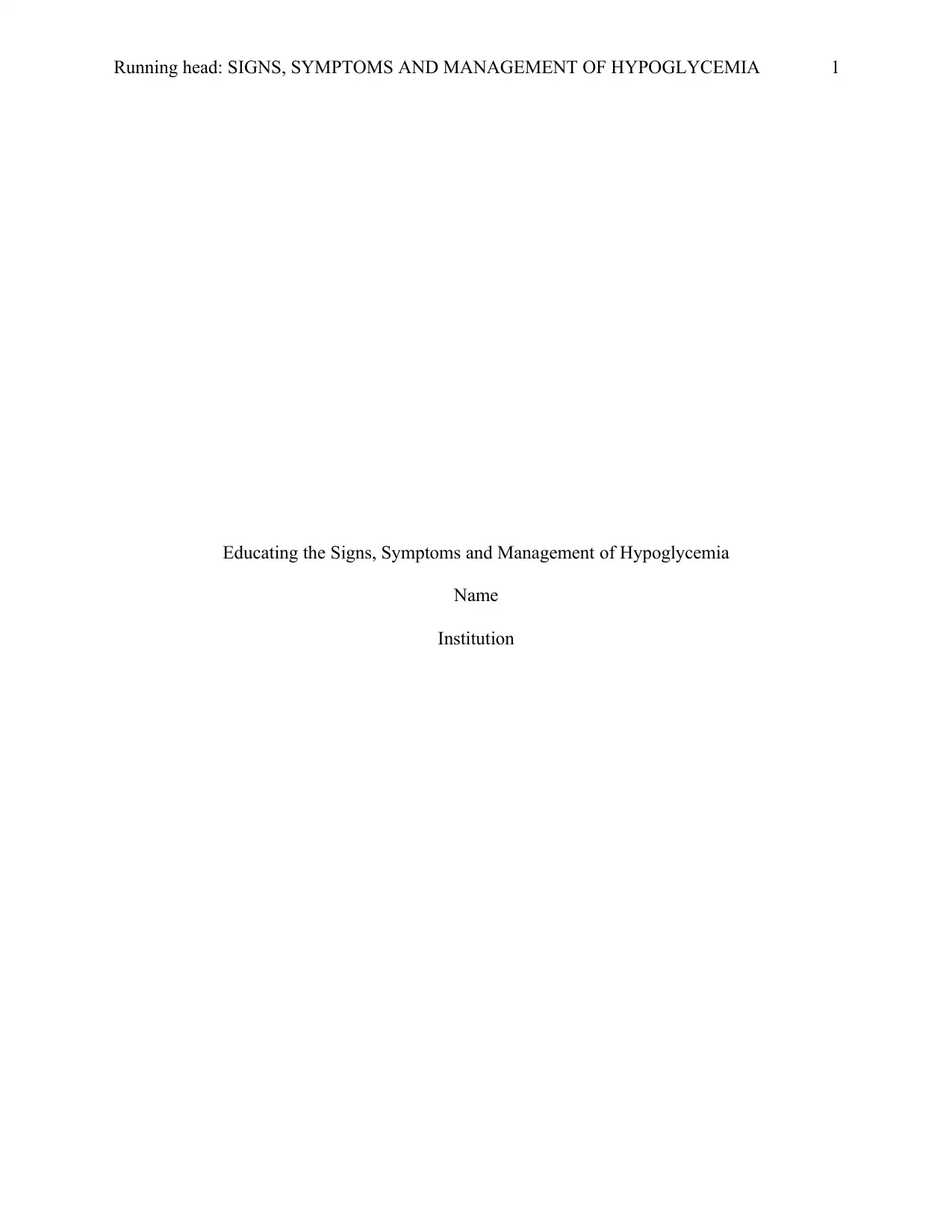
Running head: SIGNS, SYMPTOMS AND MANAGEMENT OF HYPOGLYCEMIA 1
Educating the Signs, Symptoms and Management of Hypoglycemia
Name
Institution
Educating the Signs, Symptoms and Management of Hypoglycemia
Name
Institution
Paraphrase This Document
Need a fresh take? Get an instant paraphrase of this document with our AI Paraphraser
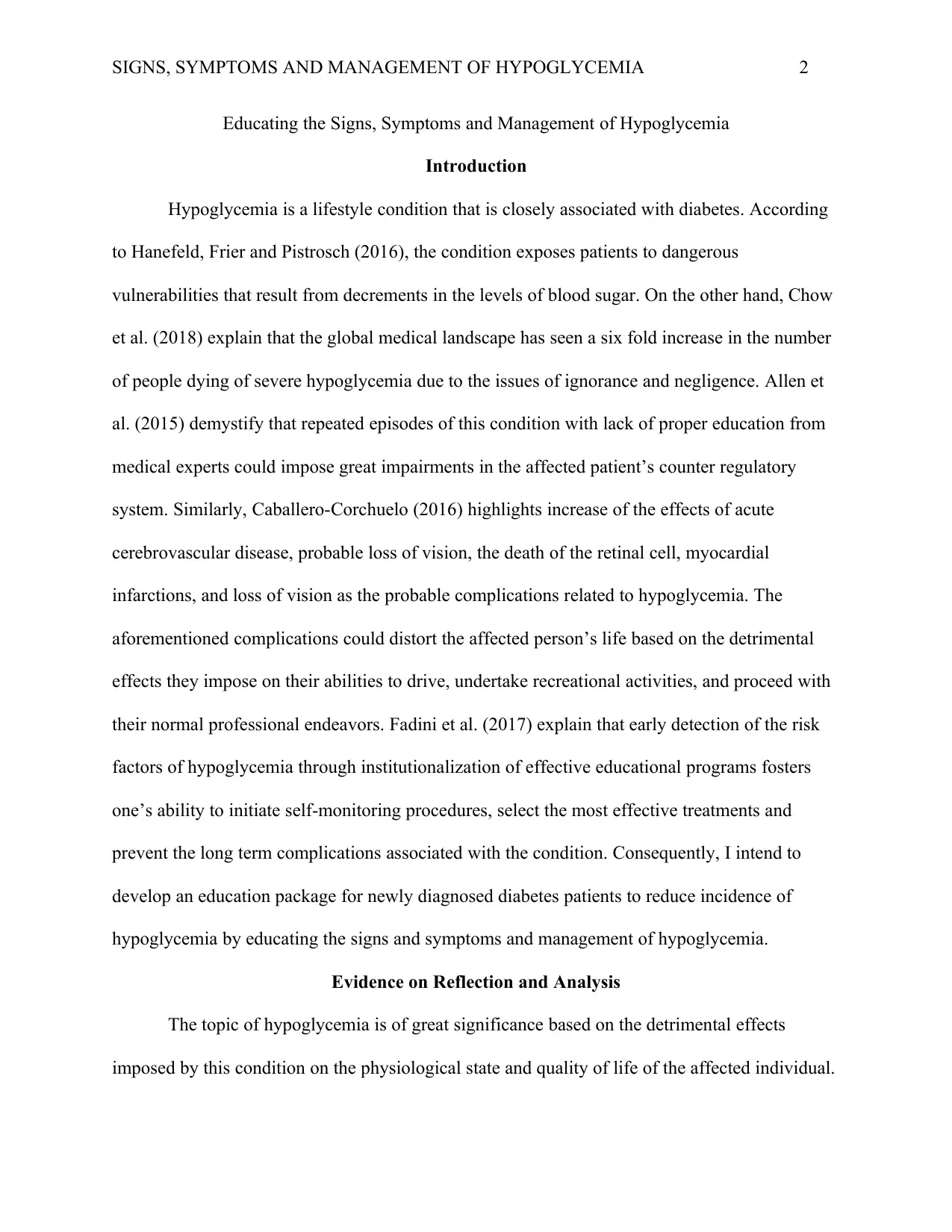
SIGNS, SYMPTOMS AND MANAGEMENT OF HYPOGLYCEMIA 2
Educating the Signs, Symptoms and Management of Hypoglycemia
Introduction
Hypoglycemia is a lifestyle condition that is closely associated with diabetes. According
to Hanefeld, Frier and Pistrosch (2016), the condition exposes patients to dangerous
vulnerabilities that result from decrements in the levels of blood sugar. On the other hand, Chow
et al. (2018) explain that the global medical landscape has seen a six fold increase in the number
of people dying of severe hypoglycemia due to the issues of ignorance and negligence. Allen et
al. (2015) demystify that repeated episodes of this condition with lack of proper education from
medical experts could impose great impairments in the affected patient’s counter regulatory
system. Similarly, Caballero-Corchuelo (2016) highlights increase of the effects of acute
cerebrovascular disease, probable loss of vision, the death of the retinal cell, myocardial
infarctions, and loss of vision as the probable complications related to hypoglycemia. The
aforementioned complications could distort the affected person’s life based on the detrimental
effects they impose on their abilities to drive, undertake recreational activities, and proceed with
their normal professional endeavors. Fadini et al. (2017) explain that early detection of the risk
factors of hypoglycemia through institutionalization of effective educational programs fosters
one’s ability to initiate self-monitoring procedures, select the most effective treatments and
prevent the long term complications associated with the condition. Consequently, I intend to
develop an education package for newly diagnosed diabetes patients to reduce incidence of
hypoglycemia by educating the signs and symptoms and management of hypoglycemia.
Evidence on Reflection and Analysis
The topic of hypoglycemia is of great significance based on the detrimental effects
imposed by this condition on the physiological state and quality of life of the affected individual.
Educating the Signs, Symptoms and Management of Hypoglycemia
Introduction
Hypoglycemia is a lifestyle condition that is closely associated with diabetes. According
to Hanefeld, Frier and Pistrosch (2016), the condition exposes patients to dangerous
vulnerabilities that result from decrements in the levels of blood sugar. On the other hand, Chow
et al. (2018) explain that the global medical landscape has seen a six fold increase in the number
of people dying of severe hypoglycemia due to the issues of ignorance and negligence. Allen et
al. (2015) demystify that repeated episodes of this condition with lack of proper education from
medical experts could impose great impairments in the affected patient’s counter regulatory
system. Similarly, Caballero-Corchuelo (2016) highlights increase of the effects of acute
cerebrovascular disease, probable loss of vision, the death of the retinal cell, myocardial
infarctions, and loss of vision as the probable complications related to hypoglycemia. The
aforementioned complications could distort the affected person’s life based on the detrimental
effects they impose on their abilities to drive, undertake recreational activities, and proceed with
their normal professional endeavors. Fadini et al. (2017) explain that early detection of the risk
factors of hypoglycemia through institutionalization of effective educational programs fosters
one’s ability to initiate self-monitoring procedures, select the most effective treatments and
prevent the long term complications associated with the condition. Consequently, I intend to
develop an education package for newly diagnosed diabetes patients to reduce incidence of
hypoglycemia by educating the signs and symptoms and management of hypoglycemia.
Evidence on Reflection and Analysis
The topic of hypoglycemia is of great significance based on the detrimental effects
imposed by this condition on the physiological state and quality of life of the affected individual.
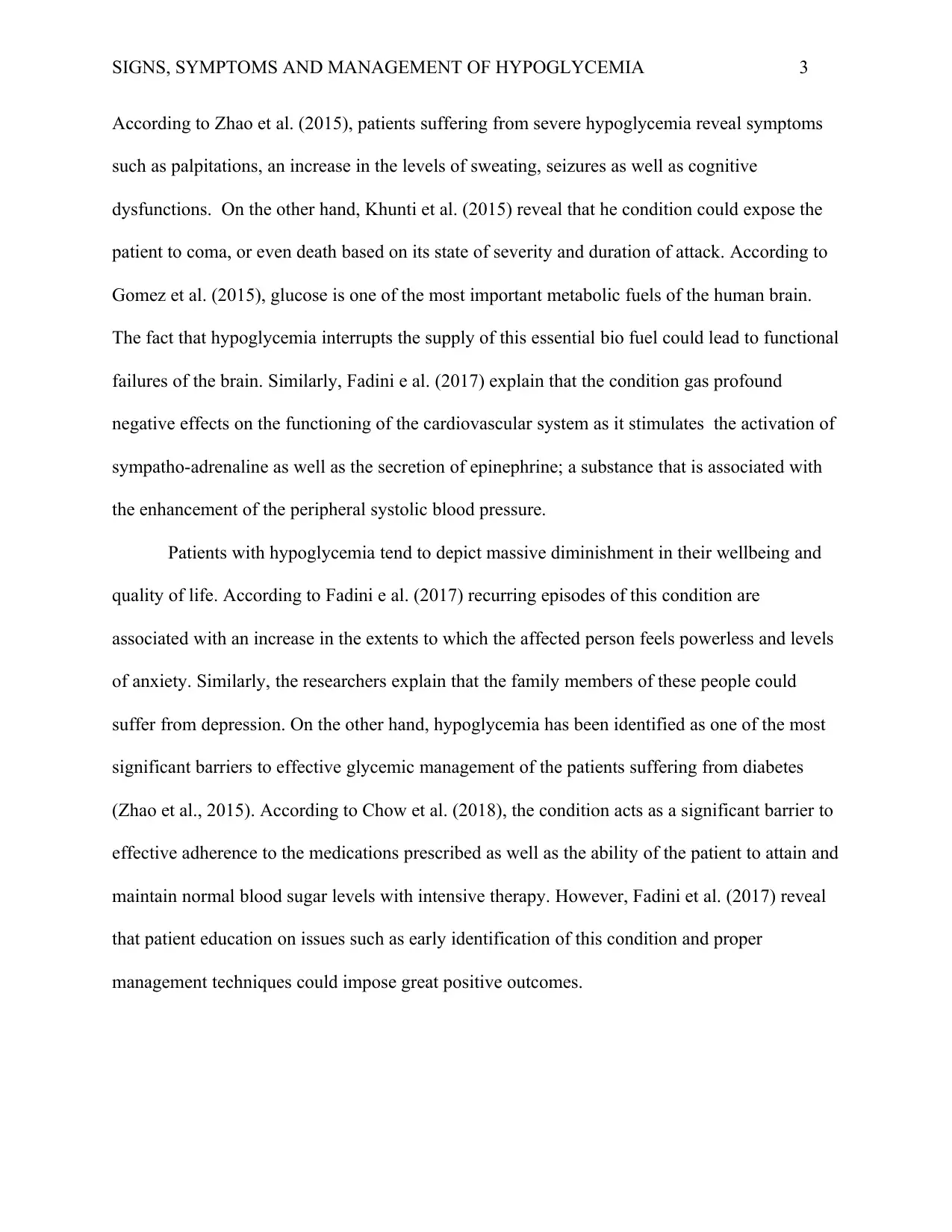
SIGNS, SYMPTOMS AND MANAGEMENT OF HYPOGLYCEMIA 3
According to Zhao et al. (2015), patients suffering from severe hypoglycemia reveal symptoms
such as palpitations, an increase in the levels of sweating, seizures as well as cognitive
dysfunctions. On the other hand, Khunti et al. (2015) reveal that he condition could expose the
patient to coma, or even death based on its state of severity and duration of attack. According to
Gomez et al. (2015), glucose is one of the most important metabolic fuels of the human brain.
The fact that hypoglycemia interrupts the supply of this essential bio fuel could lead to functional
failures of the brain. Similarly, Fadini e al. (2017) explain that the condition gas profound
negative effects on the functioning of the cardiovascular system as it stimulates the activation of
sympatho-adrenaline as well as the secretion of epinephrine; a substance that is associated with
the enhancement of the peripheral systolic blood pressure.
Patients with hypoglycemia tend to depict massive diminishment in their wellbeing and
quality of life. According to Fadini e al. (2017) recurring episodes of this condition are
associated with an increase in the extents to which the affected person feels powerless and levels
of anxiety. Similarly, the researchers explain that the family members of these people could
suffer from depression. On the other hand, hypoglycemia has been identified as one of the most
significant barriers to effective glycemic management of the patients suffering from diabetes
(Zhao et al., 2015). According to Chow et al. (2018), the condition acts as a significant barrier to
effective adherence to the medications prescribed as well as the ability of the patient to attain and
maintain normal blood sugar levels with intensive therapy. However, Fadini et al. (2017) reveal
that patient education on issues such as early identification of this condition and proper
management techniques could impose great positive outcomes.
According to Zhao et al. (2015), patients suffering from severe hypoglycemia reveal symptoms
such as palpitations, an increase in the levels of sweating, seizures as well as cognitive
dysfunctions. On the other hand, Khunti et al. (2015) reveal that he condition could expose the
patient to coma, or even death based on its state of severity and duration of attack. According to
Gomez et al. (2015), glucose is one of the most important metabolic fuels of the human brain.
The fact that hypoglycemia interrupts the supply of this essential bio fuel could lead to functional
failures of the brain. Similarly, Fadini e al. (2017) explain that the condition gas profound
negative effects on the functioning of the cardiovascular system as it stimulates the activation of
sympatho-adrenaline as well as the secretion of epinephrine; a substance that is associated with
the enhancement of the peripheral systolic blood pressure.
Patients with hypoglycemia tend to depict massive diminishment in their wellbeing and
quality of life. According to Fadini e al. (2017) recurring episodes of this condition are
associated with an increase in the extents to which the affected person feels powerless and levels
of anxiety. Similarly, the researchers explain that the family members of these people could
suffer from depression. On the other hand, hypoglycemia has been identified as one of the most
significant barriers to effective glycemic management of the patients suffering from diabetes
(Zhao et al., 2015). According to Chow et al. (2018), the condition acts as a significant barrier to
effective adherence to the medications prescribed as well as the ability of the patient to attain and
maintain normal blood sugar levels with intensive therapy. However, Fadini et al. (2017) reveal
that patient education on issues such as early identification of this condition and proper
management techniques could impose great positive outcomes.
⊘ This is a preview!⊘
Do you want full access?
Subscribe today to unlock all pages.

Trusted by 1+ million students worldwide
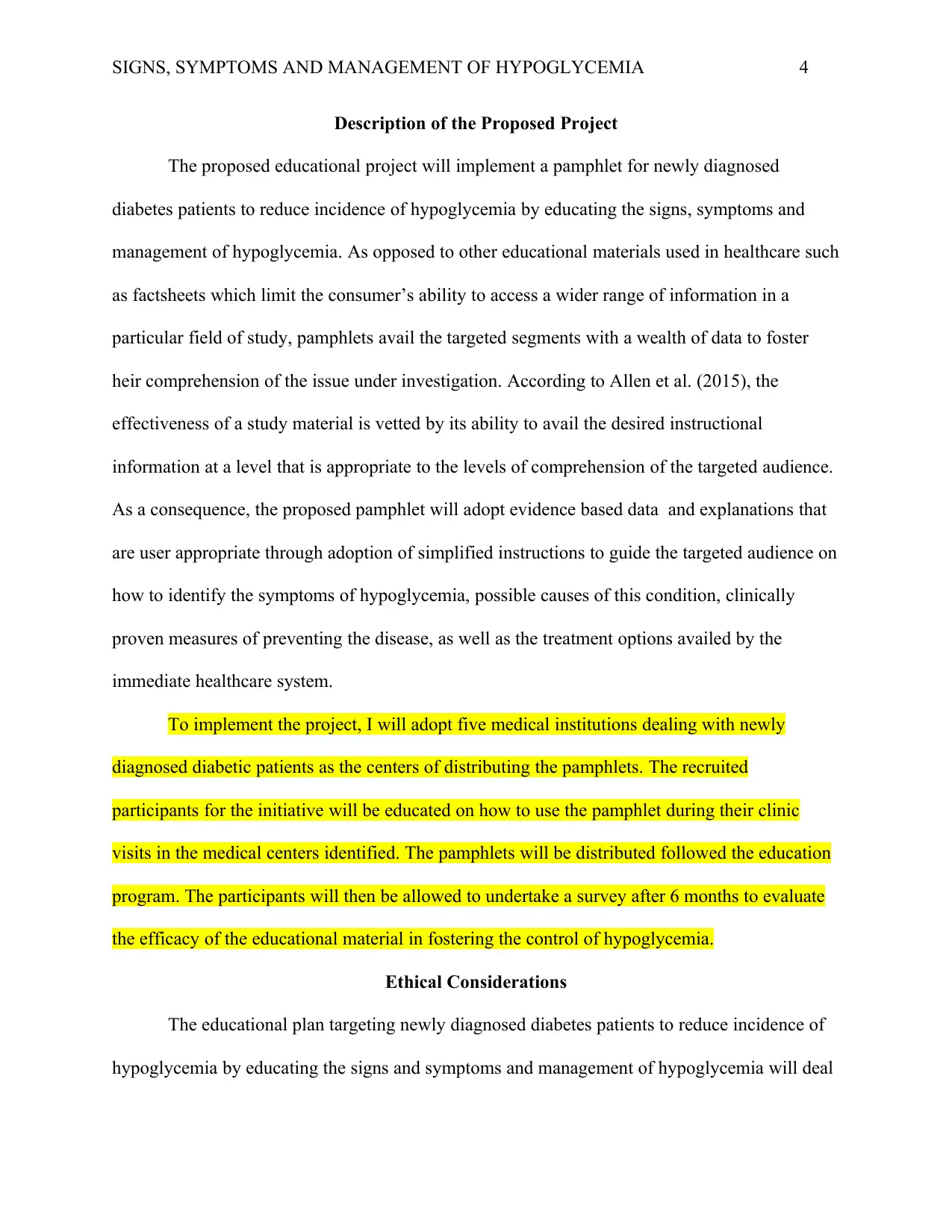
SIGNS, SYMPTOMS AND MANAGEMENT OF HYPOGLYCEMIA 4
Description of the Proposed Project
The proposed educational project will implement a pamphlet for newly diagnosed
diabetes patients to reduce incidence of hypoglycemia by educating the signs, symptoms and
management of hypoglycemia. As opposed to other educational materials used in healthcare such
as factsheets which limit the consumer’s ability to access a wider range of information in a
particular field of study, pamphlets avail the targeted segments with a wealth of data to foster
heir comprehension of the issue under investigation. According to Allen et al. (2015), the
effectiveness of a study material is vetted by its ability to avail the desired instructional
information at a level that is appropriate to the levels of comprehension of the targeted audience.
As a consequence, the proposed pamphlet will adopt evidence based data and explanations that
are user appropriate through adoption of simplified instructions to guide the targeted audience on
how to identify the symptoms of hypoglycemia, possible causes of this condition, clinically
proven measures of preventing the disease, as well as the treatment options availed by the
immediate healthcare system.
To implement the project, I will adopt five medical institutions dealing with newly
diagnosed diabetic patients as the centers of distributing the pamphlets. The recruited
participants for the initiative will be educated on how to use the pamphlet during their clinic
visits in the medical centers identified. The pamphlets will be distributed followed the education
program. The participants will then be allowed to undertake a survey after 6 months to evaluate
the efficacy of the educational material in fostering the control of hypoglycemia.
Ethical Considerations
The educational plan targeting newly diagnosed diabetes patients to reduce incidence of
hypoglycemia by educating the signs and symptoms and management of hypoglycemia will deal
Description of the Proposed Project
The proposed educational project will implement a pamphlet for newly diagnosed
diabetes patients to reduce incidence of hypoglycemia by educating the signs, symptoms and
management of hypoglycemia. As opposed to other educational materials used in healthcare such
as factsheets which limit the consumer’s ability to access a wider range of information in a
particular field of study, pamphlets avail the targeted segments with a wealth of data to foster
heir comprehension of the issue under investigation. According to Allen et al. (2015), the
effectiveness of a study material is vetted by its ability to avail the desired instructional
information at a level that is appropriate to the levels of comprehension of the targeted audience.
As a consequence, the proposed pamphlet will adopt evidence based data and explanations that
are user appropriate through adoption of simplified instructions to guide the targeted audience on
how to identify the symptoms of hypoglycemia, possible causes of this condition, clinically
proven measures of preventing the disease, as well as the treatment options availed by the
immediate healthcare system.
To implement the project, I will adopt five medical institutions dealing with newly
diagnosed diabetic patients as the centers of distributing the pamphlets. The recruited
participants for the initiative will be educated on how to use the pamphlet during their clinic
visits in the medical centers identified. The pamphlets will be distributed followed the education
program. The participants will then be allowed to undertake a survey after 6 months to evaluate
the efficacy of the educational material in fostering the control of hypoglycemia.
Ethical Considerations
The educational plan targeting newly diagnosed diabetes patients to reduce incidence of
hypoglycemia by educating the signs and symptoms and management of hypoglycemia will deal
Paraphrase This Document
Need a fresh take? Get an instant paraphrase of this document with our AI Paraphraser
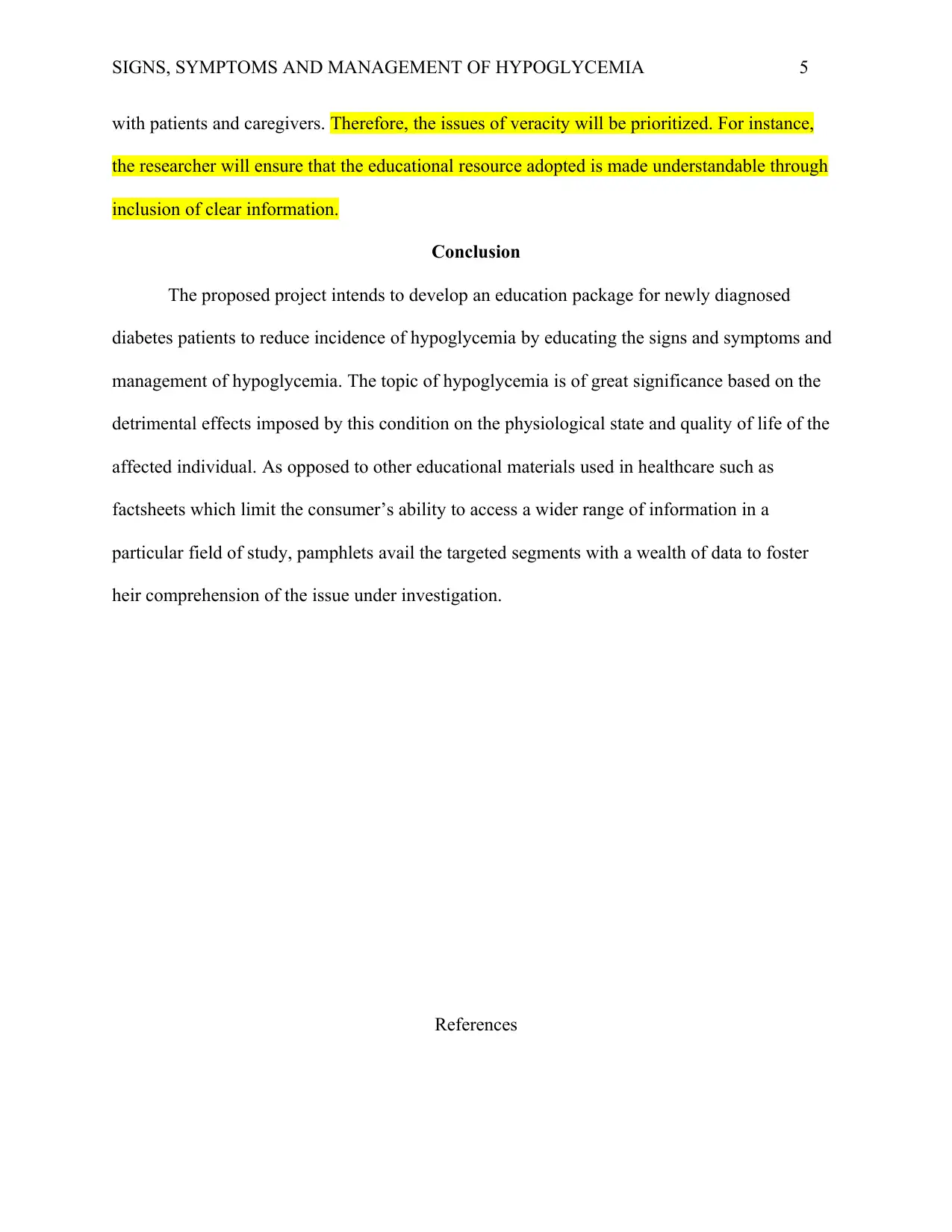
SIGNS, SYMPTOMS AND MANAGEMENT OF HYPOGLYCEMIA 5
with patients and caregivers. Therefore, the issues of veracity will be prioritized. For instance,
the researcher will ensure that the educational resource adopted is made understandable through
inclusion of clear information.
Conclusion
The proposed project intends to develop an education package for newly diagnosed
diabetes patients to reduce incidence of hypoglycemia by educating the signs and symptoms and
management of hypoglycemia. The topic of hypoglycemia is of great significance based on the
detrimental effects imposed by this condition on the physiological state and quality of life of the
affected individual. As opposed to other educational materials used in healthcare such as
factsheets which limit the consumer’s ability to access a wider range of information in a
particular field of study, pamphlets avail the targeted segments with a wealth of data to foster
heir comprehension of the issue under investigation.
References
with patients and caregivers. Therefore, the issues of veracity will be prioritized. For instance,
the researcher will ensure that the educational resource adopted is made understandable through
inclusion of clear information.
Conclusion
The proposed project intends to develop an education package for newly diagnosed
diabetes patients to reduce incidence of hypoglycemia by educating the signs and symptoms and
management of hypoglycemia. The topic of hypoglycemia is of great significance based on the
detrimental effects imposed by this condition on the physiological state and quality of life of the
affected individual. As opposed to other educational materials used in healthcare such as
factsheets which limit the consumer’s ability to access a wider range of information in a
particular field of study, pamphlets avail the targeted segments with a wealth of data to foster
heir comprehension of the issue under investigation.
References
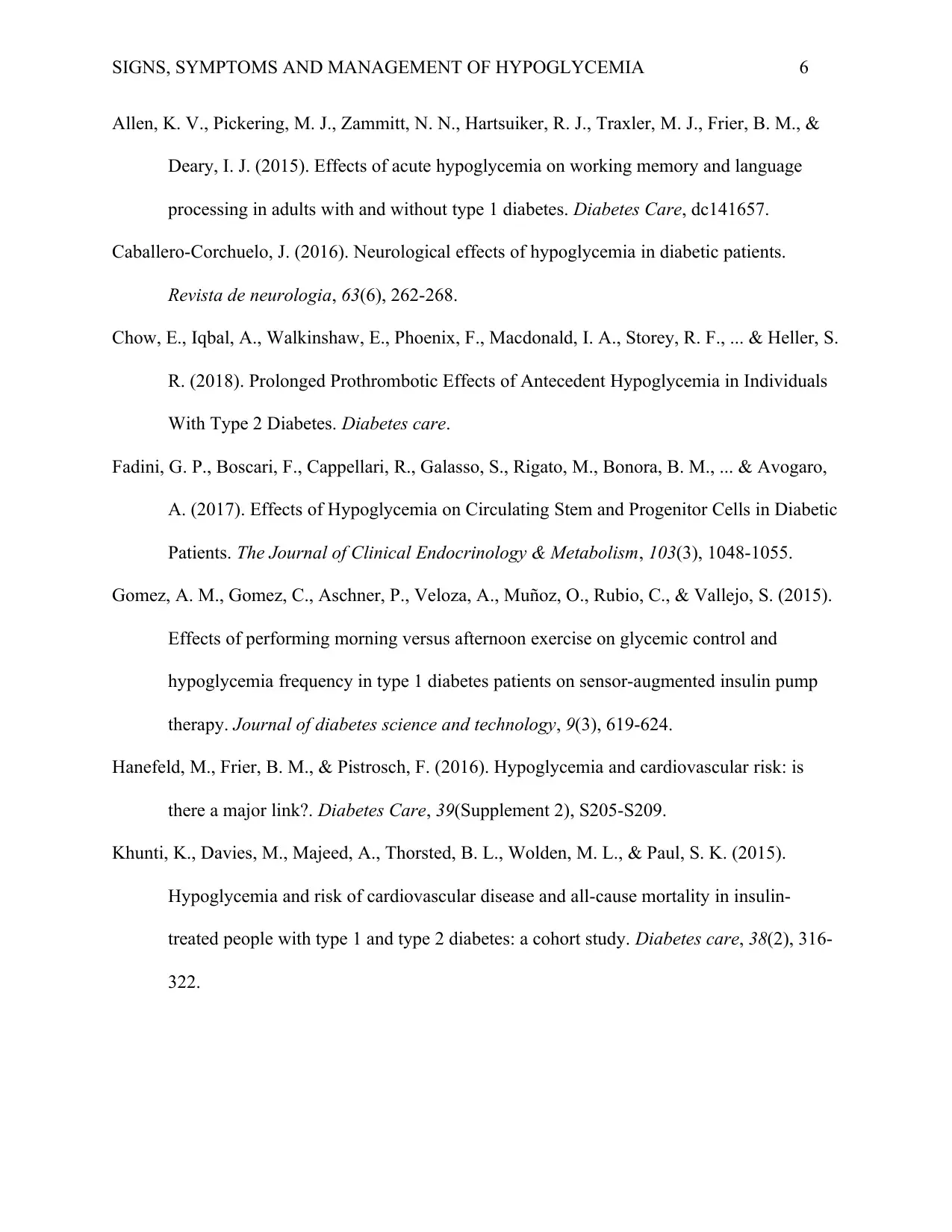
SIGNS, SYMPTOMS AND MANAGEMENT OF HYPOGLYCEMIA 6
Allen, K. V., Pickering, M. J., Zammitt, N. N., Hartsuiker, R. J., Traxler, M. J., Frier, B. M., &
Deary, I. J. (2015). Effects of acute hypoglycemia on working memory and language
processing in adults with and without type 1 diabetes. Diabetes Care, dc141657.
Caballero-Corchuelo, J. (2016). Neurological effects of hypoglycemia in diabetic patients.
Revista de neurologia, 63(6), 262-268.
Chow, E., Iqbal, A., Walkinshaw, E., Phoenix, F., Macdonald, I. A., Storey, R. F., ... & Heller, S.
R. (2018). Prolonged Prothrombotic Effects of Antecedent Hypoglycemia in Individuals
With Type 2 Diabetes. Diabetes care.
Fadini, G. P., Boscari, F., Cappellari, R., Galasso, S., Rigato, M., Bonora, B. M., ... & Avogaro,
A. (2017). Effects of Hypoglycemia on Circulating Stem and Progenitor Cells in Diabetic
Patients. The Journal of Clinical Endocrinology & Metabolism, 103(3), 1048-1055.
Gomez, A. M., Gomez, C., Aschner, P., Veloza, A., Muñoz, O., Rubio, C., & Vallejo, S. (2015).
Effects of performing morning versus afternoon exercise on glycemic control and
hypoglycemia frequency in type 1 diabetes patients on sensor-augmented insulin pump
therapy. Journal of diabetes science and technology, 9(3), 619-624.
Hanefeld, M., Frier, B. M., & Pistrosch, F. (2016). Hypoglycemia and cardiovascular risk: is
there a major link?. Diabetes Care, 39(Supplement 2), S205-S209.
Khunti, K., Davies, M., Majeed, A., Thorsted, B. L., Wolden, M. L., & Paul, S. K. (2015).
Hypoglycemia and risk of cardiovascular disease and all-cause mortality in insulin-
treated people with type 1 and type 2 diabetes: a cohort study. Diabetes care, 38(2), 316-
322.
Allen, K. V., Pickering, M. J., Zammitt, N. N., Hartsuiker, R. J., Traxler, M. J., Frier, B. M., &
Deary, I. J. (2015). Effects of acute hypoglycemia on working memory and language
processing in adults with and without type 1 diabetes. Diabetes Care, dc141657.
Caballero-Corchuelo, J. (2016). Neurological effects of hypoglycemia in diabetic patients.
Revista de neurologia, 63(6), 262-268.
Chow, E., Iqbal, A., Walkinshaw, E., Phoenix, F., Macdonald, I. A., Storey, R. F., ... & Heller, S.
R. (2018). Prolonged Prothrombotic Effects of Antecedent Hypoglycemia in Individuals
With Type 2 Diabetes. Diabetes care.
Fadini, G. P., Boscari, F., Cappellari, R., Galasso, S., Rigato, M., Bonora, B. M., ... & Avogaro,
A. (2017). Effects of Hypoglycemia on Circulating Stem and Progenitor Cells in Diabetic
Patients. The Journal of Clinical Endocrinology & Metabolism, 103(3), 1048-1055.
Gomez, A. M., Gomez, C., Aschner, P., Veloza, A., Muñoz, O., Rubio, C., & Vallejo, S. (2015).
Effects of performing morning versus afternoon exercise on glycemic control and
hypoglycemia frequency in type 1 diabetes patients on sensor-augmented insulin pump
therapy. Journal of diabetes science and technology, 9(3), 619-624.
Hanefeld, M., Frier, B. M., & Pistrosch, F. (2016). Hypoglycemia and cardiovascular risk: is
there a major link?. Diabetes Care, 39(Supplement 2), S205-S209.
Khunti, K., Davies, M., Majeed, A., Thorsted, B. L., Wolden, M. L., & Paul, S. K. (2015).
Hypoglycemia and risk of cardiovascular disease and all-cause mortality in insulin-
treated people with type 1 and type 2 diabetes: a cohort study. Diabetes care, 38(2), 316-
322.
⊘ This is a preview!⊘
Do you want full access?
Subscribe today to unlock all pages.

Trusted by 1+ million students worldwide

SIGNS, SYMPTOMS AND MANAGEMENT OF HYPOGLYCEMIA 7
Zhao, F., Deng, J., Yu, X., Li, D., Shi, H., & Zhao, Y. (2015). Protective effects of vascular
endothelial growth factor in cultured brain endothelial cells against hypoglycemia.
Metabolic brain disease, 30(4), 999-1007.
Zhao, F., Deng, J., Yu, X., Li, D., Shi, H., & Zhao, Y. (2015). Protective effects of vascular
endothelial growth factor in cultured brain endothelial cells against hypoglycemia.
Metabolic brain disease, 30(4), 999-1007.
1 out of 7
Related Documents
Your All-in-One AI-Powered Toolkit for Academic Success.
+13062052269
info@desklib.com
Available 24*7 on WhatsApp / Email
![[object Object]](/_next/static/media/star-bottom.7253800d.svg)
Unlock your academic potential
Copyright © 2020–2025 A2Z Services. All Rights Reserved. Developed and managed by ZUCOL.




